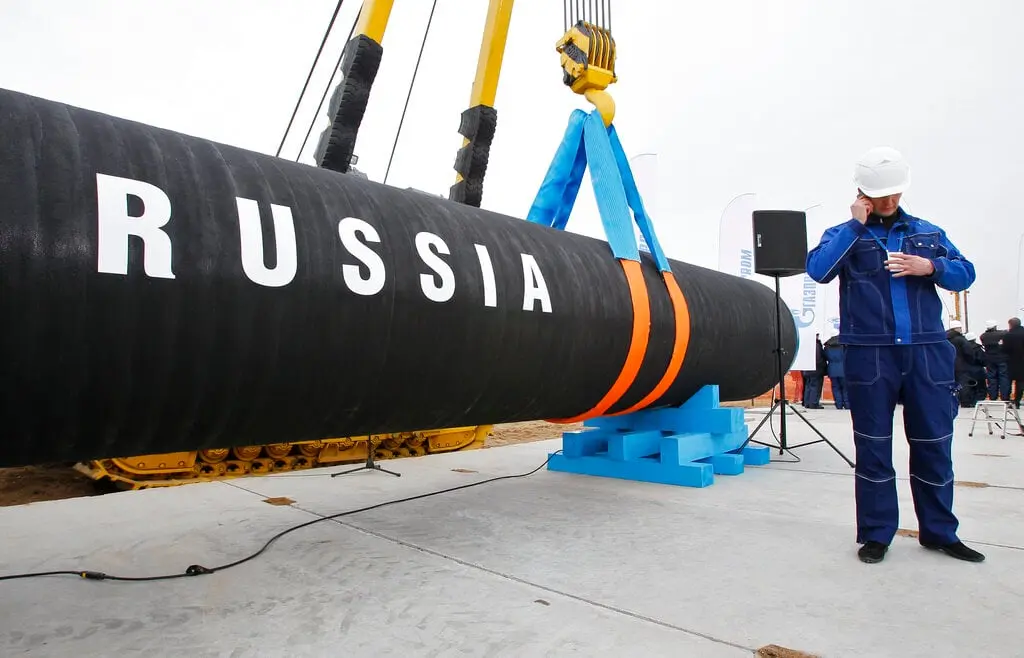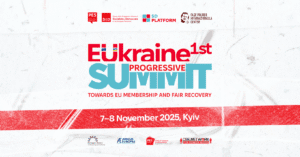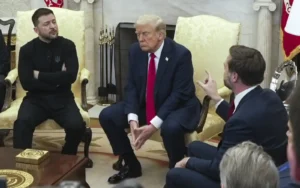Picture: Construction on the Nord Stream pipeline – FMT
Robert Fico, Slovakia’s prime minister, made headlines in recent weeks with bizarre statements about Ukraine and a visit to Russian President Vladimir Putin. After Ukraine decided that they would not renew a contract allowing Russian gas to be transported across their territory to Europe, Fico accused Ukrainian President Volodymyr Zelensky of blackmail, calling it behaviour of ‘typical Ukrainians.’ Slovakia is now in trouble because it is still almost entirely dependent on Russian gas. This contract allowed it to benefit from cheap energy for a long time, but now the price of gas is also going up significantly in Slovakia.
Fico is, of course, trying to shift the blame for this onto someone else. He had almost three years to become less dependent on Russian gas, but did nothing during that time. He knew this contract was going to expire and it was certainly not unreasonable to think that Ukraine would not allow the gas used to pay for Russian weapons to be transported through their own country again. Fico is clearly responsible for this, but he is now trying to blame Ukraine for the consequences of his own mismanagement. Rather than trying to find a solution with other European countries now, Fico immediately went to Russian President Vladimir Putin for help.
This is all straight out of the populist’s book. Fico defends his actions by pointing to the people of Slovakia. After all, if he does not arrange for cheap gas from Russia, the ‘common man’ in Slovakia will have to pay a higher gas bill. In this way, Fico is trying to achieve a short-term political success, but is not at all looking for solutions that guarantee a long-term energy supply for his country. Slovakia will only become more dependent on Russia in this way, and if they do something Putin doesn’t like in the future, he can just stop the delivery of gas. This is very unwise and it makes perfect sense that large protests broke out in Slovakia against Fico’s pro-Russian course.
The risks for Europe
This is not only a risk for countries like Slowakia or Hungary, but also for example for Germany or the Netherlands. It will probably not quickly happen that the Dutch prime minister vistits Putin to discuss a new gas deal, but even in the Netherlands something like this might happen. In the country, there have already been sky-high gas prices since the start of the war in Ukraine, and just last week NOS reported that the price of gas in the Netherlands is currently at its highest point in over a year. This logically causes a lot of frustration, especially when some other countries do still get gas from Russia and pay a lower gas price. This provides a perfect opportunity for populists who want to score political points with this issue. In Germany you can already see this with the success of the AFD and the BSW, both of which advocate for importing cheap gas from Russia again.
These parties pretend that the increased gas prices are only due to the sanctions on Russia. The easiest solution then, of course, is to lift these sanctions and get gas from Russia again. This is not only morally incredibly problematic, but also far too short-sighted. The real problem is that, over the past decades, Europe has made itself enormously dependent on a potential aggressor. Even after the annexation of Crimea, the Nordstream 2 gas link was still built to get additional gas from Russia.
An independent European energy sector
European dependence on Russian gas was and is a strategic risk. Populists like Fico and parties like the AFD and BSW are trying to achieve short-term political successes by advocating for cheap Russian gas. Of course, this sounds very attractive, especially if you can barely pay the energy bill, but strategically this is hugely unwise. Moreover, the sanctions against Russia do have an effect. The Russian economy is unstable and in the long run it is not sustainable to continue the war on this scale without plunging the economy into a crisis.
Thus, we have to remain vigilant. In the Netherlands a government led by the far-right PVV party is in power. Before the PVV took part in the current government, they already openly turned against European sanctions on Russia. Moreover, the leader of the PVV is already advocating to scale down support to Ukraine to free up money in the budget. If the AFD or the BSW will get to power in Germany at the next elections, it is also not hard to guess what they will do. Therefore, we have to keep emphasizing that gas from Russia endangers European security. We should not go back to the mistakes we made before the war in Ukraine, but instead invest massively in an independent European energy sector and diversify our energy supply.
Written by Guido Boven



